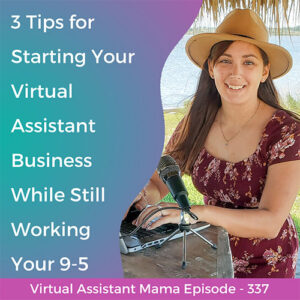
Episode 337: 3 Tips for Starting Your Virtual Assistant Business While Still Working Your 9-5
In this episode of the Virtual Assistant Mama podcast, I’m sharing 3 tips to help you start your Virtual Assistant business while still working your 9-5.
As a new freelancer/virtual assistant, you probably want to look professional without spending too much money on the systems you need to run your business.
That’s why, on today’s episode, I’m sharing 7 free tools that will help you run the backend of your business so you can save time and money and start working from home with your babies faster.
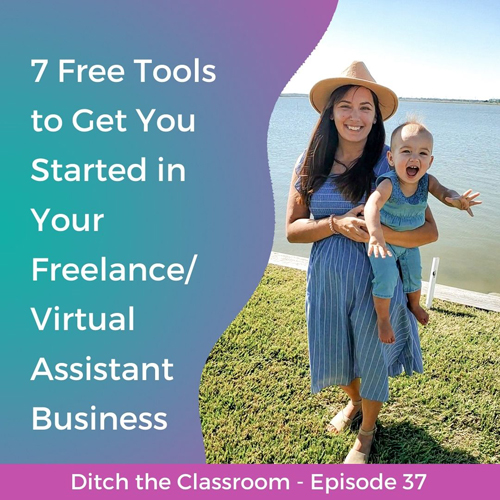
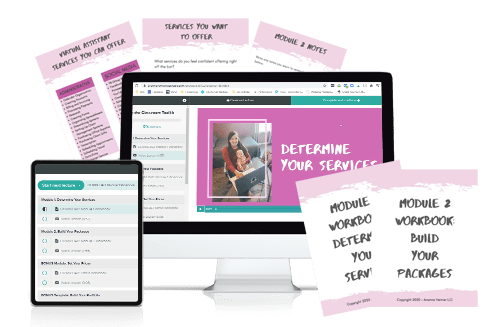
Grab your Ditch the Classroom Toolkit for only $47!
Make sure to check out our resources page to gain access to more free resources to help you start your Ditch the Classroom journey!
Have any questions for me? Feel free to send me an email at arianna@ariannavernier.com or on Instagram @arianna.vernier! I love chatting with y’all and helping you hit the ground running. Are you ready? Let’s go.
Love,
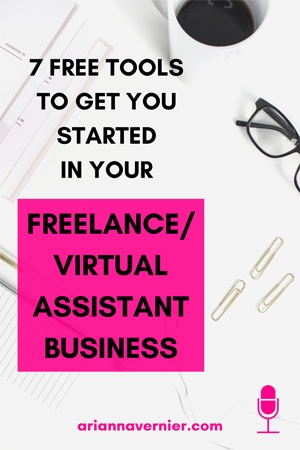
Full Episode Transcription:
(00:07):
When you’re starting your freelance/virtual assistant business, you want to save as much money and time as possible while still looking professional. I know a lot of women that I work with are starting this as more of a side-hustle while they’re still teaching. You don’t wanna have to invest too much, but at the same time, you wanna come across as a professional, legitimate business. So in today’s episode, I’m gonna give you seven free tools to help you look professional for new clients and make your business a little bit easier and save you time. So, number one, this is pretty basic, but still very important. You need a professional email. Please don’t use the email you created when you were 13. I know my email domain was girlygirl_13. Please don’t use that. Please don’t use one that you created when you were in your teens. The best option is to create one with your first name and last name at Gmail. Gmail’s a really good platform. It looks a little more professional than some of the other ones, and it’s a really good one to go with. So create a free email with them. Keep it simple. And that way you can also keep that separate from any of your other emails you’re getting, you can keep your, your client and potential client emails separate from everything else.
(03:16):
The second tool I have for you is Calendly. Now, when you are talking to potential clients, they’re gonna want to schedule a call with you, generally. We call that the “Discovery Calls” or the “interview call”, and they’re gonna wanna chat with you to see what services you can offer and how you can help them. So you need to be able to send them your calendar with specific times that you’re available for this call. So, it’s Calendly that C-A-L-E-N-D-L-Y. You can set specific days and times that you’re available to make sure that it’s not gonna clash with anything else you have going on in your life. You can also attach questions. So, before they can submit for the specific time they choose, they have to answer some questions so that you can learn a little bit more about their business and come prepared to the call to talk with them.
(04:14):
So you can ask questions like, what’s your website? If they have one. What are your social media links? Who’s your ideal client? What’s your budget? Things like that. So you can do a little bit of homework prior to the call. Okay? When you actually have the call, I highly recommend doing like a face-to-face, not over the phone. A lot of people do the phone and you wanna set yourself apart and you want to build that connection with them. And the best way to do that is to do it face-to-face. So. Tool number three is to use Zoom. Lots of people are very familiar with Zoom, but it’s just a meeting software where you can chat face-to-face with a potential client, ask them questions. They can learn about you and the services you offer and how you can help them.
(05:07):
So you just send them a free Zoom link before the meeting. They’ll hop on. Make sure when you set it up that you just do the waiting room, you don’t need to do the passcode. That’s just a little too complicated. But that’s a really good freeway to make yourself stand out among other people applying for the position. Okay. When you are ready to sign on this new client, they loved you on the discovery call. They’re ready to hire you. You need a contract, you need a signed contract. So really great tool for this is called HelloSign all one word. Hello S-I-G-N. With HelloSign, you can upload your contract to it, and then you can add signature boxes in the specific spots that it goes. And then send that contract to your potential client to sign. You get three contracts for free per month. So this is a really good place for you to start out free tool and still cover your business legally. So that was number four: HelloSign.
(06:24):
Now in order to actually get paid, you need a platform for that. So tool number five is Stripe. I highly recommend Stripe. They do take a little bit of a percentage, but it’s not as much as others. And that’s just something you can factor into your business expenses and write off on taxes at the end of the year. But it’s better than PayPal. PayPal sometimes, if a potential client were to dispute a charge, PayPal tends to go in favor of the purchaser and not support you as much. So sometimes that can just really cause issues for you and your business. Especially if you did the work, and then the client tries to say you didn’t, you don’t want PayPal going in favor of them without being able to show proof that you did in fact, do the work. So I like Stripe because they’re just a little better about that if any issues are to arise. Okay? So you can set up a free account with them, connect it to your bank account and then get paid.
(07:28):
Okay. What number are we on? Six! Tool number six. If you are working hourly for your clients, then I highly recommend using Toggl to keep track of the hours that you’re working. This is spelled T-O-G-G-L, and it’s just basically a stopwatch, and you just track your time when you’re working on specific projects. And you can put a note in there of what you did during that time. And you can also export your like time sheet basically and send to your clients so that they can see where their time was spent. So again, that’s toggle T-O-G-G-L. Okay, free tool number seven. One of my absolute favorites, especially if you are doing any kind of social media management or things where you need to create graphics, I highly recommend Canva, C-A-N-V-A. Canva has so many different templates for you to create Pinterest pins.
(08:43):
You can create Instagram graphics, website covers, PDFs for freebies that your clients wanna create. All kinds of different things. I don’t recommend creating logos on there, they actually have specific rules that you’re not supposed to create a logo on there. But anything for social media or PDFs. Like I said, anything like that, Canva is a great resource. They’ve already created templates for you. So you can just plug -in colors, content, and photos, and you’re good to go. You can create from scratch. They do have a pro version, which is also super cool. And it’s not that much. It’s only like $13 a month. So if you’re in more of the graphic design, you may want the pro version, but the free is already amazing. So you really don’t need much else than that. If you’re not doing a whole lot with it, Canva is definitely the way to go.
(09:38):
All right. So just to recap, you wanna make sure that you’re setting all of these up preferably before you start landing clients, start chatting with them. Now you just have all your backend systems set up, set up and you’re ready to rock. So number one is your professional email, just your first and last name at gmail.com. Number two is Calendly. So people can book calls with you and answer questions before the call. Zoom is number three so that they can chat with you face-to-face, and you can stand out and build that connection with them. Number four is HelloSign, so you can send contracts to your future clients and make sure your business is legally protected. Number five is Stripe, so you can get paid, ’cause we know all know that’s why we’re doing this. Number six is Toggl, T-O-G-G-L, so you can track your time and show your clients what you’re spending different time on. And number seven is Canva, free design program so you can create all the social media graphics, PDFs, everything your clients need. All right. I hope this was very helpful for y’all. Let me know if you have any questions about these specific programs. I’m always here to help you guys. And I’m just so grateful for each and every one of you who listens to this show, whether you’re new or you’ve been here a while and listen to every episode. I just love you. I hope you have a great rest of your week and I will see you next time.

In this episode of the Virtual Assistant Mama podcast, I’m sharing 3 tips to help you start your Virtual Assistant business while still working your 9-5.
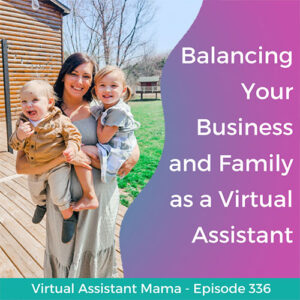
In this episode of the Virtual Assistant Mama podcast, I’m sharing how to balance your business and family life as a Virtual Assistant.
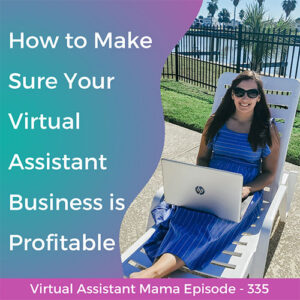
In this episode of the Virtual Assistant Mama podcast, I’m sharing how to make sure your Virtual Assistant business is profitable.